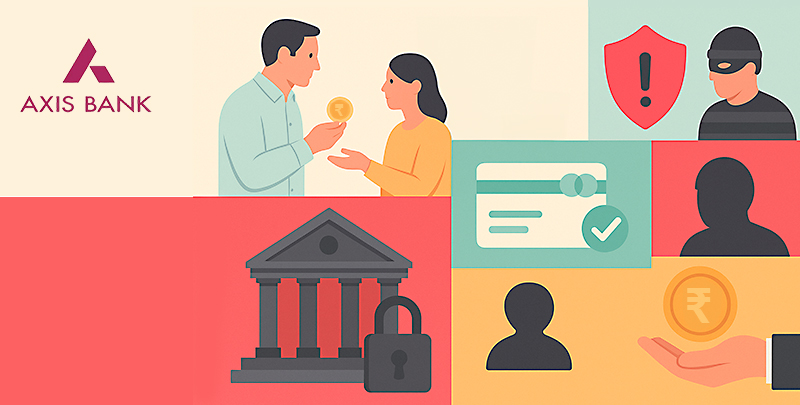- Accounts
- Digital Savings Account
- Savings Account
- Digital Salary Account
- Salary Account
- Digital Current Account
- Current Account
- Trust NGO Institutional Savings Account
- Safe Deposit Locker
- Safe Custody
- Pension Disbursement Account
- PMJDY
- Silver Linings Program
- Doctors Banking Program
- Young sparks program
- Self Employed Banking Program
- Deposits
- Cards
- Forex
Send Money AbroadSend Money to India
- Loans
24x7 Loan
- Investments
- Insurance
General InsuranceHealth Insurance
- Payments
- Offers & Rewards
- Learning Hub
- Bank Smart
- Open digital A/C
Explore 250+ banking services on Axis Mobile App
Scan to Download
- Current Account
- Pay
- Collect
- Trade
Services
Solution for Exporters
- Debt & Working Capital
24x7 Loans
For MSMEs with turnover up to ₹30 Cr
- Treasury
- Transact Digitally
- Home
- Blogs
- Savings Account Guide
- How To Open A Bank Account Online

Savings Account
How To Open A Bank Account Online
“Do it online” is the buzz phrase these days. Right from shopping, buying movie tickets, and much more is done on real-time basis powered by high-speed internet connection on a smartphone/tablet/laptop/desktop.
Truly, technology has brought a revolutionary change in many aspects of human life, and banking is no exception. Gone are the times when you had to personally visit a bank’s branch to open a bank account, fetch account statements, transfer funds, pay utility bills, and so on. You have the luxury to do it all online in the comfort of your home, office, café, or even while you are on the go.
Opening a savings bank account is the first step in the journey of wealth creation. Saving, and thereafter investing sensibly, is paramount if you wish to accomplish your financial goals.
Here are some characteristics of a savings bank account:
- A savings bank account helps you address your liquidity needs, and is principal to your investment activity.
- It can help you pay utility bills, transfer money, withdraw, and so on. Plus, most banks offer debit cards which can be used while shopping as well as earn reward points, get discounts, cash-backs and much more!
- Savings accounts have daily withdrawal limits, and you are required to maintain minimum cash balance unless it specifically is a zero-balance account or a salary account.
- A saving account should be opened by everyone, irrespective of economic strata, what you do for a living and your residential status. Unlike other banking and financial products, there are almost no restrictions to open a savings bank account. For minors too, a savings bank account can be opened by their parents/guardians.
The documents required to open a savings bank account are:
- Address proof (Aadhaar, passport, electricity bill, telephone bill, ration card, etc.)
- Photo identification proof (Aadhaar, voter id, PAN card, passport, driving license, etc.)
- Age proof (birth certificate, passport, Aadhaar, voter id, PAN card etc.)
- Income proof (Salary slips, Form 16, Income-tax Returns, etc.)
- Senior citizen card (in case of senior citizens)
- Senior citizen card (in case of senior citizens)
There are a variety of saving bank accounts today, with frills and no-frills, with distinguishing features catering to your need. A regular savings account, salary account, senior citizen savings account, youth savings account, zero balance savings account, linked savings account are some of the types of savings bank accounts.
Axis Bank, for instance, has Basic Savings Account, EasyAccess Savings Account, Prime Plus Savings, Prime Savings Account, Women’s Savings Account, Senior Privilege Savings Account, Future Stars Savings Account, Youth Account, Pension Savings Account, Insurance Agent Account, and many more ––each having distinct features addressing to a target group. (For more details visit: https://www.axis.bank.in/accounts/savings-account ).
Many of these saving accounts come with a debit card that can be used for withdrawals, shopping, etc. and can earn you eDGE Loyalty reward points, get discounts, earn cash-backs and much more! So, with a gamut of saving accounts, Axis Bank can make banking simple and easy for you. For those who aren’t very tech/net savvy or are senior citizens, Axis Bank has a ‘doorstep banking’ facility too for services such as pick up of cash, delivery of cash/demand draft, and pick up of instruments.
As regards to the average monthly balance requirements and fees, it varies depending on the type of savings bank account. Currently, the interest rate for a savings account ranges from 3.0% to 6.0%, depending on the daily account balance with an advantage of a better rate for those maintaining a higher account balance.
So, while parking short-term or near-term money in a savings bank account could be sensible, it is also important to explore other alternatives, whereby your hard-earned money can grow and counter inflation more effectively.
What are the options?
If your bank is not offering high interest on savings account, a flexi deposit, and auto sweep-in facility are two options that can earn a higher rate of interest on your money idling in your savings account. Both these options, which are linked to your savings bank account, can help you prevent loss of return with minimum fuss.
Flexi Deposit
A flexi deposit is nothing but a bank term deposit (also known as fixed deposit) that offers you both higher rates of interest as well as total flexibility to break the deposit. You need to have a savings bank account and also book a fixed deposit with the bank. Your fixed deposit will then be linked to your savings bank account, and in case there is insufficient fund to clear your issued cheque, the deficit amount will automatically get transferred from your fixed deposit to your savings bank account.
For example, you have Rs 20,000 in your savings bank account and also have booked a fixed deposit worth Rs 2 lakh with the bank. Now, this Rs 2 lakh fixed deposit will be linked to your savings bank account and in case of an insufficient balance in your savings bank account, the fund from this fixed deposit will be used to defray the shortfall in the savings account. Suppose you issue a cheque of Rs 25,000 towards payment of credit card bill and your savings bank account has just Rs 20,000 balance, the deficit of Rs 5,000 will be taken from your linked fixed deposit and your credit card bill will be paid off.
In the above example, the savings bank account balance will earn you interest, plus you’ll earn a higher interest on the fixed deposit This is an added advantage for you, helping you address your liquidity needs (for any emergency that may arise) and at the same time earn higher returns. Decide the tenure of the flexi-deposit based on the financial goal/s you want to achieve and your interim liquidity needs.
Sweep-in Facility
To your savings bank account, you can set a threshold limit, above which any amount deposited in the account will automatically move to a fixed deposit and earn a higher rate of interest prevailing on the fixed deposits for the tenure that it remains with the bank. In case your savings account balance is low or insufficient to clear your issued cheque, you need not worry about it. Any deficit in your savings bank account will be taken care by your fixed deposits.
To give you an example, say you have set a threshold limit of Rs 10,000 in your savings bank account and have deposited Rs 50,000 in the account. Here, the amount over Rs 10,000 will be swept into a term deposit, i.e. in this case Rs 40,000, earning a higher rate of interest. Now if a cheque is issued, from the saving bank account towards credit card dues of Rs 15,000, but the savings account balance is just Rs 10,000, the deficit of Rs 5,000 will be recovered from the term deposit.
The aforesaid facility will earn interest on savings bank account, plus a higher rate on term deposit and at the same time facilitate you to maintain your liquidity needs.
The basic difference between Flexi Deposit and Sweep-in Facility:
In a sweep-in facility, any amount above a threshold limit automatically gets converted into a term deposit and you do not need to book a new term deposit with your bank. While for a Flexi Deposit, first you need to make a fixed deposit with your bank, which will then be linked to your savings bank account.
So, the sweep-in facility is a more convenient way to park your short-term and near-term requirements, plus meet your contingency requirement.
Axis Bank has something known as ‘Automatic Deposits’ linked to your savings bank account, which facilitates automatic transfers in multiples of Rs 5,000 to a fixed deposit when the balance in the Savings Account crosses Rs 25,000. The minimum tenure of such deposits is 6 months, while the maximum is 5 years. Your money in the Automatic Deposit can be easily accessed via a cheque or ATM withdrawals. This amount is automatically reverse swept from the Automatic Deposits to the savings account, whenever the savings account balance falls below Rs 25,000. The remaining amount in the Automatic Deposit continues to earn a higher contracted rate of interest.
Of course, premature withdrawals from the term deposits contracted attract a penalty.
As regards the tax implications, TDS (Tax Deduction at Source) in respect to interest earned on the term deposit is applicable on the basis of the total interest projected on the aggregate of term deposits for the financial year. If the total projected interest in a financial year crosses the threshold limit ––which currently is Rs 10,000 ––TDS will be deducted proportionately from the existing fixed deposits at the time of interest application. This is in accordance with Section 194A 3 (i) (a) of the Income Tax Act, 1961. Likewise, the interest earned on savings bank account is taxable, while a deduction of upto Rs 10,000 is available per the provisions of Section 80TTA of the Income-tax Act, 1961.
Hence, sensibly park money in a savings bank account. Assess your liquidity needs, risk profile, your financial goals and also consider other productive investment avenues wherein you hold an opportunity to potentially earn better returns to accomplish financial goals.
How to open a bank account online?
All you got to be is a little net savvy and smart to give your savings a perfect start. The process is simple and user friendly. Here are some helpful points:
- Prefer a bank with sound financials, and check the interest rate offered. It’s prudent not to get swayed just because a bank is offering a higher rate of interest. Opt in for a bank which best suits your requirements.
- Log on to the website of the bank you wish to open an account with. Pease note, not all banks have the online account creation facility; but some can arrange a call-back with you.
- Fill in the online application form and submit digital copies of your address proof, age proof, income proof, photo identification proof and photographs. But remember, some banks may require you to send physical copies of these documents for which they will send over an executive.
- Your details will be verified by the backend operation team of the bank, and account will opened for you, almost instantly.
Online banking gives you the power to bank at your ease and convenience.
But, keep in mind these few points when banking online:
- Never give your password/pin to anybody –– Sometimes fraudsters posing as bank officials may call you and state there is some problem with your bank account, and may ask for your telephonic pin / customer id / password and so on. You must never share such details with anyone. Even if an official customer care executive asks you any such information, do not disclose it verbally as this could make your account/card vulnerable to frauds.
- Be careful about emails asking for your personal details –– Very often people receive emails which state that they have won an amount of prize money. Such emails might ask for your bank account number, password, and other personal details. They might also provide links, which by clicking on it displays a page that appears to be the page of your bank’s website, but in reality is a fake page that will store your customer id and password when you enter it. So, be extremely careful while entering your personal details and only enter these details on the bank’s official site.
- Dispose cards or vital documents carefully –– Dispose expired or redundant debit card and credits when a new card is issued to you. (For instance, recently several credit card companies replaced the customer's credit card with a chip and pin card). In order to avoid the misuse of your card, the old card must be cut into several pieces before disposal. Similarly, in case you want to dispose any important documents which contain details of your address, contact number, date of birth, etc., ensure that they are completely torn before discarding.
Be in complete control of your personal finance; after all, it is a question of your hard-earned money.
Remember, saving enough and investing it prudently with the needed financial discipline are important ingredients for your long-term financial wellbeing. Begin your journey today!
Happy banking, happy investing!
Table of Contents
Related Services
Learning Hub
Look through our knowledge section for helpful blogs and articles.
Feb 1, 2026
10 min read
3.1k Views
How to determine which Savings Account is right for you?
Thornton T. Munger, a notable research expert in forestry for the U.S...
Feb 1, 2026
2 min read
778 Views
Tips to save more in 2025: 5 best savings tips
As we step into 2025, you should reflect on your financial goals and make a resolution to save more.
Feb 1, 2026
5 min read
2.9k Views
How to open a Jan Dhan Yojana Account? - Step-by-step guide
Jan Dhan Account is a part of Pradhan Mantri Jan-Dhan Yojana (PMJDY)...
Feb 1, 2026
3 mins read
4.4k Views
Seamlessly update your Bank Account address: A step-by-step guide
When you change your address, whether due to a move or personal reasons...














